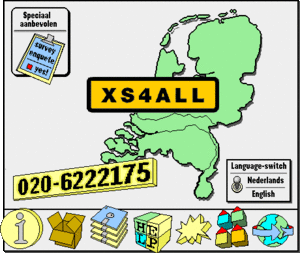XS4ALL

XS4ALL (internet slang for "access for all") is the third-oldest ISP in the Netherlands, after NLnet and SURFnet. However, XS4ALL was the first company to offer internet to individuals. Based in Amsterdam, it offers dial-up access as well as ADSL. XS4ALL is currently (2007) one of the larger ISPs in The Netherlands. The company is known for its willingness to take on controversial issues; has taken spammers to court, and fought other courtroom battles, such as Scientology vs. the Internet.
History[edit]
XS4ALL was established in Amsterdam in 1993 by Felipe Rodriquez, Rop Gonggrijp, Paul Jongsma and Cor Bosman. It grew out of Hacktic Network, a UUCP network. Hacktic Network was started by the contributors to Hack-Tic, an underground hackers' magazine. Rop Gonggrijp edited and published Hack-tic and Felipe Rodriquez operated "Utopia", a hacker BBS that was one of the largest nodes on the network. XS4ALL was originally only the name of the system used to connect paying users to the online Internet (as opposed to access to the offline UUCP service, which was offered for free). Since many more users used XS4ALL than any other service, the organization subsequently renamed itself to XS4ALL and later transformed itself from a non-profit into a for-profit enterprise. XS4ALL quickly grew into a large full-service ISP.
On January 15, 1994, De Digitale Stad ("The Digital City") opened, the result of a joint venture by De Balie, the Amsterdam cultural center, and XS4ALL (then still called Hacktic Netwerk). DDS was a Free-Net, a free system open to the public. The aim of DDS was to bring politics and citizens together in an online community.
XS4ALL initiated the Dutch Internet Industry Association (NLIP) in 1995. Together with a large number of other Internet providers, the association was created with Felipe Rodriquez, then the director of XS4ALL, as its chairman until 1997. As one of the leading organizations within NLIP, XS4ALL has always had a strong voice against censorship regulation and against the erosion of privacy.
In December 1998, XS4ALL was sold to the Dutch incumbent telecom company KPN but continued to operate as an independent daughter. XS4ALL has since proven capable of maintaining its own cultural and political identity.
Activism and controversies[edit]
Scientology
In 1995 members of the Church of Scientology caused a raid on the servers of Dutch Internet provider XS4ALL as part of a bigger conflict with its online critics and sued it and Karin Spaink for copyright violations because of citing out of some confidential materials of Scientology. There followed a summary judgment in 1995, full proceedings in 1999, an appeal in 2001 which has been upheld by the Supreme Court of Netherlands in December 2005, all in favor of the provider and Karin Spaink, putting freedom of speech above copyright in some cases.
Station B92
In December 1996, XS4ALL put the Belgrade radio station B92 online using streaming audio technology in response to the jamming of its broadcasts by the regime of Slobodan Milošević. XS4ALL installed a leased line to the radio station in response to a request from Adrienne van Heteren, a Dutch citizen who went to Belgrade to set up various cultural activities. After XS4ALL had launched the online broadcast of Radio B92, its signal was picked up by the Voice of America and transmitted back into Serbia.
Radikal Magazine
In September 1996, members of the German Internet Content Task Force (ICTF) blocked XS4ALL for about a month because one of its subscribers had put an issue of Radikal Magazine on his homepage. Radikal is illegal in Germany, and to prevent its publication the German Bundesanwaltschaft (prosecutor's office) ordered commercial ISPs in Germany to block its website. They ended up blocking the entire XS4ALL site, which at the time had about 6,000 personal and commercial homepages. XS4ALL insisted that the case to be settled by the courts, because it did not want to infringe on its customers' rights of free expression; however, the requests to follow traditional legal paths were ignored by the German ICTF.
On April 11, 1997, one of the biggest German ISPs, the DFN academic backbone network, started an IP-filtering blockade against XS4ALL. Many protest letters were sent, mirrors were once again set up around the world, and the complete issue of radikal 154 was posted in the newsgroup de.soc.zensur. As a result, the blockade only lasted a few days. The founders of XS4ALL were interrogated as suspects of publication of terrorist propaganda, but no legal actions were initiated against them. XS4ALL then implemented several technologies to sabotage the censorship attempt, such as automatically rotating the IP address of its website. The ICTF ended up censoring all IP traffic to the XS4ALL domain, including e-mail. After a couple of weeks this became untenable; a global protest against the censorship emerged, and a global network of mirror sites was created by the online community. The ICTF abandoned its efforts after several weeks.
Corporate culture[edit]
In December 1998, XS4ALL was sold to the Dutch incumbent phone company KPN, but it has nonetheless kept its unique character and identity. Many of the original employees, especially system managers, still work there.
XS4ALL also sponsors and hosts the sites of many Free Software projects, like Python, Squirrelmail and Debian.
About XS4all[edit]
- Shuchen Tan, "An interview with Felipe Rodriquez and Rob Gonggrijp / XS4all", Trouw, Feb 1995.
- Sabine Helmers, "Xs4all and XS2all internet information", written for ZKP3 @ Metaforum III, Budapest, Oct 1996.
- Maarten Reijnders, De Hackers die Nederland veranderden, Amsterdam: Podium, 2023. Publisher. (Dutch)